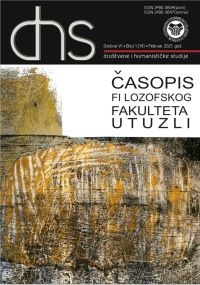Razlike u osobinama ličnosti i porodičnom okruženju ovisnika o heroinu i nekonzumenata psihoaktivnih suptanci
Differences in Personality and Family Environment of Heroin Addicts And Non-consumers of Psychoactive Substances
Author(s): Tamara Efendić-Spahić, Elvis Vardo, Mitra Mirković-HajdukovSubject(s): Psychology, Personality Psychology, Substance abuse and addiction
Published by: Filozofski fakultet Univerziteta u Tuzli
Keywords: heroin addicts; personality dimensions; family environment;
Summary/Abstract: The research dealt with the identification of significant differences in the basic dimensions of personality according to the five-factor model between two groups of respondents: heroin addicts and the control group of respondents, non-consumers of psychoactive substances. Also, we wanted to determine whether the respondents - heroin addicts in relation to the non-clinical group differ significantly in personality traits given the completeness of the family environment in which they grew up and the propensity of parents to alcoholism and violent behavior. The study included a sample of 297 subjects, of which 155were heroin users and 142 were non-clinical control group subjects, students of different study profiles of the University of Tuzla. The clinical and non-clinical samples were uniform in terms of characteristics important for the research. In order to test the research hypotheses, in addition to the insight into the descriptive parameters, a one-way analysis of variance was used. The results show that heroin users achieve significantly higher results in the dimensions of Agreeableness (F = 21.51; p = 0.00),Conscientiousness (F = 13.89; p = 0.00) and Neuroticism (F = 13.23; p = 0.00), while the clinical and non-clinical groups do not differ significantly in the dimensions of Openness and Extraversion. In the group of heroin consumers, respondents coming from incomplete families achieve significantly lower results on the Conscientiousness dimension (F = 4.20; p = 0.04), the tendency to consume parental alcohol proved to be a significant factor for the Neuroticism dimension (F = 4.39; p = 0, 04) and openness (F = 15.41; p = 0.00), while parental propensity to violent behavior proved to be a significant factor for the Neuroticism dimension (F = 4.49; p = 0.04) and Openness (F = 15.41; p = 0.00). ). When it comes to the non-clinical control group, family completeness and characteristics of the family environment (parents ‘tendency to consume alcohol and parents’ tendency to violent behavior) did not prove to be significant factors for differences in personality traits.
Journal: DHS-Društvene i humanističke studije: časopis Filozofskog fakulteta u Tuzli
- Issue Year: XIV/2021
- Issue No: 14
- Page Range: 273-308
- Page Count: 36
- Language: Bosnian

